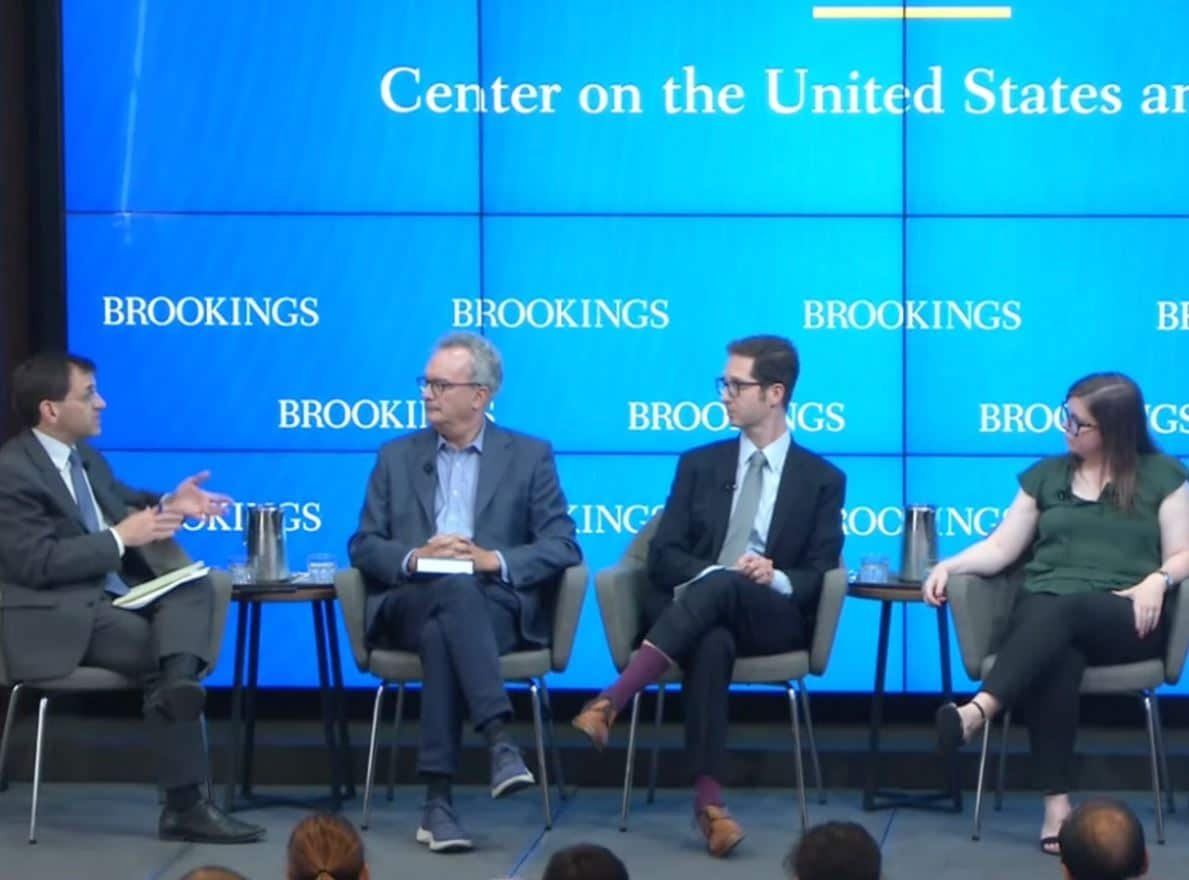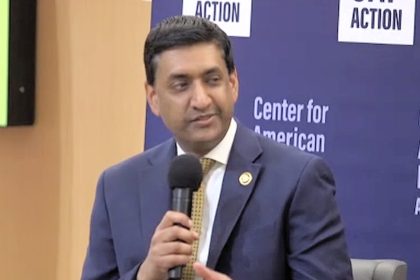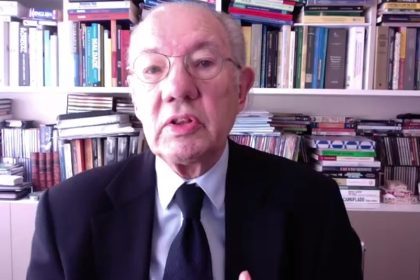Experts Evaluate NATO Enlargement

WASHINGTON — Intense academic and policy discussions about the security, political and societal consequences of expansion have existed since the North Atlantic Treaty Organization’s inception, and with the potential future admission of Ukraine, debates continue to run hot.
Ahead of NATO’s upcoming summit in Vilnius, Lithuania, the Brookings Institution gathered experts — including co-editors of the new book “Evaluating NATO Enlargement: From Cold War Victory to the Russia-Ukraine War,” James Goldgeier and Joshua R. Itzkowitz Shifrinson, as well as two chapter author experts — to offer insights into the process and consequences of NATO expansion.
NATO was originally founded in 1949 to counter potential Soviet aggression, and it has seen significant enlargement since the end of the Cold War.
The alliance included 16 North American and European member states when the USSR collapsed in 1991. Between 1999 and 2020, the organization admitted 14 additional members from Central and Eastern Europe that sought military security and political stability. And in the wake of Russia’s full-scale invasion of Ukraine in February 2022, Finland joined, Sweden’s application is pending and Ukraine’s possible accession continues in debate.
“Enlargement was used to help shape these new allies to look like Western Europe, to fit in around that table,” said Jim Townsend, who was, in the 1990s, the director of NATO policy and the director of the defense plans division at the U.S. Mission to NATO in Brussels, Belgium.
Yet, according to Shifrinson, verbal assurances were made in the 1990s that led leaders in Moscow to believe that NATO would cease to expand eastward.
“I think it is now fairly well established … that, yes, there were assurances given in the course of German reunification that Washington said NATO would not expand into the former Warsaw Pact and would respect Soviet interests after German reunification,” he said.
But Townsend said any potential assumptions would have been quashed at NATO’s Bucharest Summit in 2008 when allies welcomed Ukraine’s and Georgia’s Euro-Atlantic aspirations for membership.
“The date was uncertain but the 2008 communiqué said they will be [in] NATO,” Townsend said. “That helped to light the fuse into where we are today.”
One of the main arguments in favor of NATO enlargement is the security and deterrence it provides. With the inclusion of new member states, particularly from Central and Eastern Europe, the alliance has extended its security umbrella and offered protection against potential aggression.
The principle of collective defense enshrined in Article 5 of the NATO treaty ensures that an attack on one member is considered an attack on all. This provision has served as a deterrent against aggression from external forces, as demonstrated by the reluctance of Russia to provoke conflicts with NATO countries.
For example, “I don’t see any other way to keep Putin from attacking Ukraine than to bring Ukraine into NATO,” Goldgeier said.
But opponents of NATO enlargement raise valid concerns about the risks and downsides of admitting new members.
“I have come to the informed position that taking Ukraine into NATO would be a mistake for the United States and for the alliance as a whole,” Shifrinson said, adding that his cost-benefit analysis of U.S. involvement doesn’t come out in America’s favor and that he doesn’t believe the Russia threat to Europe is as great as some believe.
But it’s true that expanding the alliance could provoke hostile reactions from countries like Russia and escalate tensions. There are concerns about the possibility of direct involvement in conflicts and the potential for a larger-scale war.
“For the U.S. to support Ukraine joining NATO we have to be willing to say we’re going to lay our blood, time, treasure and perhaps lives on the line for Ukraine,” Shifrinson said.
Goldgeier said the Biden administration appears to be in agreement.
“[The administration] has been very clear that [it is] not interested at this moment in pursuing membership for Ukraine in NATO,” he said. “[It] wants to do everything it can to support Ukraine, but is not interested in starting World War III … and doesn’t want American troops to have to be directly involved in the war.”
Furthermore, there is the question of whether every country seeking membership aligns with the strategic interests and values of NATO. The issue of corruption and governance challenges in certain aspiring member states, such as Ukraine, is another factor that critics highlight.
“I do believe that when we pull Ukraine in … there’s going to have to be a real wire brushing about how Ukraine has done business before this war,” Townsend said. “The corruption issue [always] loomed very large with Ukraine.”
The debate on NATO enlargement extends beyond the immediate interests of individual member states. It also encompasses broader questions about the role and purpose of the alliance as a whole.
Discussions surrounding this consider the impact on European security and the alliance’s ability to fulfill its mission effectively. Balancing the interests of various member states and addressing concerns about insecurity recognizes that NATO expansion affects the alliance’s cohesion, decision-making processes and the broader provision of European security.
“The alliance is always more complicated than our stereotypes leave it to be,” Susan Colbourn, associate director of Duke University’s Program in American Grand Strategy said. “We tend to focus … very narrowly in the United States on Ukrainian membership in NATO and whether the costs or benefits are good for … American interests, but there is also a macro decision about what a decision to admit Ukraine, what a decision to close the door on Ukraine entirely — or to any of the half or potential interim measures in between the two ends of the spectrum — what it means for the alliance as a whole.”
Rather than focusing solely on NATO enlargement, alternative approaches to European security have been proposed. Some argue for the European Union to assume a more significant role in security matters, with NATO playing a reinforcing role. Encouraging capable allies within the EU to take more responsibility could provide a complementary framework to address security challenges.
“You can’t really evaluate NATO enlargement as a policy unless you compare it to the alternatives,” Goldgeier said.
“I would advocate for the EU to take on more responsibility with NATO playing a reinforcing role,” Shifrinson said, “and encouraging our strong, rich and capable allies to take up more of the burden.”
“There’s [also] a lot of talk within the administration about the so-called ‘Israel model,’” Goldgeier said. “But Israel has nuclear weapons. I don’t think we want Ukraine to have nuclear weapons.”
So, what’s next for NATO remains unclear.
“We [authors] agree that NATO enlargement created security and stability for Central and Eastern Europe [and that] NATO enlargement contributed to the deterioration of U.S.-Russia relations,” Goldgeier said, with the caveat that even absent enlargement, he doesn’t think the relationship would look much different.
A program is not yet finalized, but enlargement will undoubtedly be hotly debated when Lithuania hosts the next NATO Summit on July 11-12, 2023.
You can reach us at [email protected] and follow us on Facebook and Twitter
























